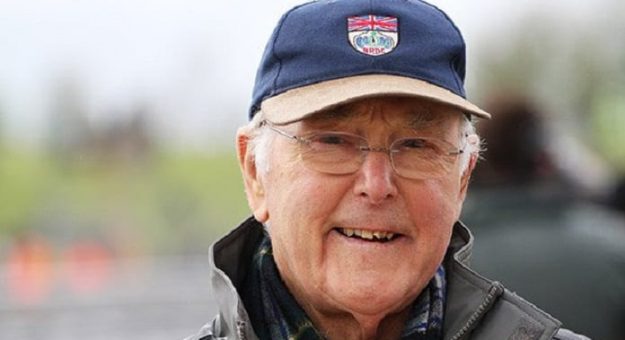WARWICKSHIRE, England — Longtime BBC motorsports commentator Murray Walker, perhaps best known for his role in BBC’s Formula One coverage, died Saturday morning.
Walker was 97. His death was confirmed by officials from the British Racing Driver’s Club, of which Walker was an associate member.
“It’s with great sadness we share the news of the passing of BRDC associate member Murray Walker, OBE,” read a statement from the BRDC. “(He was) a friend, a true motorsport legend, the nation’s favorite commentator and had a contagious smile.
“We thank Murray for all he has done for our community.”
Of Scottish descent, Walker’s father Graham participated in the Isle of Man TT, while his mother, Elsie Spratt, was the daughter of Bedfordshire businessman Harry Spratt.
Walker served as part of the British army during World War II, and after the war ended, he briefly followed in his father’s footsteps with a short motorcycle racing career before moving in the direction of advertising and television.
Walker’s first public broadcast was at Shelsley Walsh hill climb in 1948, and he received a recorded audition for BBC at Goodwood on Easter Monday the following year.
His radio broadcast debut came at the 1949 British Grand Prix, launching a 13-year tenure of commentary of the Isle of Man TT alongside his father, before his father’s passing in 1962. He remained the BBC’s lead motorcycle commentator for several years after.
Walker finally went full time in the Formula One world for the 1976 season, after occasional broadcasts earlier in the decade, and worked alongside 1976 F-1 world champion James Hunt from the Monaco Grand Prix in 1980 through the 1993 Canadian Grand Prix.
Following Hunt’s passing midway through the 1993 season, Walker remained with the BBC through the end of the 1996 campaign, when he followed Britain’s F-1 television rights deal to ITV and paired with Martin Brundle in the commentary box.
Walker retired from full-time Formula One commentary following the 2001 United States Grand Prix at Indianapolis Motor Speedway, where he was awarded an original brick from the racing surface by then-track president Tony George.
Walker’s autobiography, “Unless I’m Very Much Mistaken,” was published in late 2002 following his retirement from regular television work. He returned to the BBC briefly at the end of 2005 for the inaugural race of the Grand Prix Masters series and served as an ambassador for the Honda Racing F1 Team for half of the 2006 season.
Over the next decade, Walker appeared in various selected broadcast and journalistic capacities surrounding F-1 before finally stepping back in 2018 due to his declining health.
“The Formula One family is immensely sad to hear that Murray Walker has passed away,” read a statement from F-1 officials on Saturday. “His passion and love of the sport inspired millions of fans around the world. He will forever be a part of our history, and will be dearly missed.”
“It is with great sadness that I have to inform Silverstone’s fans that Murray Walker died earlier today,” added Silverstone Circuit managing director Stuart Pringle. “He was to so many of us fans of F-1, the voice that epitomized the sport we love. Knowledgeable beyond words and with a passion that occasionally got the better of him in commentary, he brought the sport and some of its greatest moments to life in a way that ensured they remained seared in our memories for ever.
“Much will be written about the impact that Murray had on the sport … but for the time being, rest in peace Murray, and thank you.”
